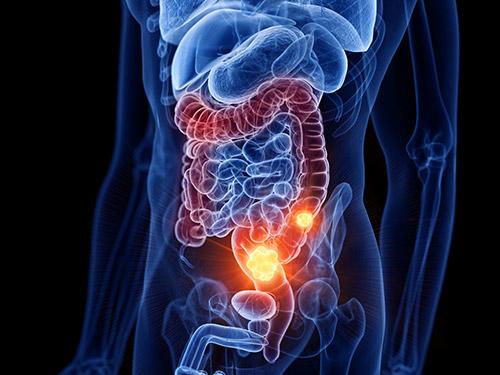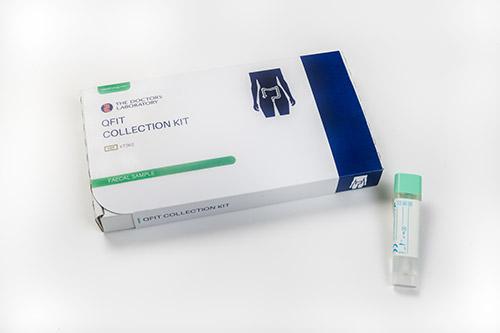
FIT tests for bowel cancer - what you need to know
Key Takeaways
- Bowel cancer is often missed until it’s at a late stage and it’s harder to cure.
- If you’ve noticed a change in your bowel habit, stomach pain or other bowel symptoms, you should consider taking a FIT test.
- A FIT test looks for microscopic amounts of blood in the stool, which can be a sign of bowel cancer.
- If no blood is found on the FIT test then it’s very unlikely you have bowel cancer.
- If blood is found in the stool, then you might need further tests.
Have you experienced a change in your usual bowel habit or other gut symptoms? Bowel cancer is the UK’s fourth most common cancer, but in most cases it’s not diagnosed early enough1. A quantitative faecal immunochemical test or FIT/qFIT test can be used to test for bowel cancer and hopefully pick it up early. We’ll break down the risks of bowel cancer, symptoms, how to test yourself and what your FIT results actually mean for you.
What is bowel cancer?
Bowel cancer, or colorectal cancer, begins in the large intestine (aka large bowel) or in the rectum. Bowel cancer is very common in the UK. 1 in 15 men and 1 in 18 women are expected to develop bowel cancer in their lifetime1.
Despite being the fourth commonest cancer in the UK1, bowel cancer is often only spotted at a late stage because any symptoms take a while to develop. This is why it has the second highest link to cancer death in the UK2. The sooner you can get diagnosed, the better.

Who’s at risk of getting bowel cancer?
The main factors that increase your risk of getting bowel cancer are your age, lifestyle and family history.
Age
As with most cancers, your risk of getting bowel cancer increases with age. Between 2016 and 2018, more than 4 in 10 people who got bowel cancer in the UK were over 75. At the other end, fewer than 1 in 10 people with bowel cancer were under 501.
However, the rate of bowel cancer in this under 50 group is increasing in the UK and other Western countries3. In fact, the under 50 age group is the only age group in which rates of bowel cancer are going up. It’s decreasing in all other age groups, likely due to screening and improved awareness. The rise in bowel cancer amongst the young is thought to be due to lifestyle factors.
Lifestyle
If you eat processed meat, drink alcohol regularly, smoke, don’t get much exercise or eat enough fibre, you’re more likely to get bowel cancer4. Your risk is higher if you’re overweight or obese. Over half of bowel cancer cases in the UK are thought to be preventable because they’re linked to lifestyle factors we can change5.

Family
If someone in your close family has bowel cancer, especially your parents or siblings, you’re more likely to get it. This may be because you’re related and your genes make you more susceptible. It could also be because you live similar lifestyles, too.
What are the bowel cancer symptoms to watch out for?
The main symptoms of bowel cancer are blood in your stool, stomach discomfort and a change in your bowel habit - either how often you’re going or to stool consistency - that doesn’t settle down.
Don’t worry though - if you’re having these symptoms it doesn't mean it’s definitely bowel cancer. There are lots of causes of bowel symptoms and most are nothing to worry about. For example, most of us are familiar with temporary changes to our bowel habits after eating something that didn’t agree with us! But if you’ve got symptoms that aren’t settling down or don’t feel right to you then it’s worth getting them checked out. A quick stool test can help you take the first step.
How do I test for bowel cancer?
There are two types of tests for bowel cancer. One tests for bowel cancer directly and the other looks for “biomarkers” of bowel cancer, but doesn't pick it up directly.
To pick up bowel cancer directly you really need to look inside the bowel with a camera. This is called a colonoscopy (looking at the whole bowel) or flexible sigmoidoscopy (looking at the left side of the bowel) and is the “gold-standard” to pick up bowel cancer. Unfortunately, it can only be done in hospital, requires bowel preparation, can be uncomfortable and has some risks. Although we use a lot of camera tests to diagnose bowel cancer, we typically use the other “indirect” biomarker tests first to see if someone is at risk of bowel cancer.
Blood in the stool is a very good biomarker of bowel cancer and the quantitative faecal immunochemical test - or FIT test - is the best test we have to pick it up. It can pick up microscopic amounts of blood in the stool. A FIT test doesn’t just tell us if there’s blood in the stool or not, it tells us how much blood there is. The higher the level, the more likely it is that bowel cancer is causing it.

However, it’s really important to understand that there are lots of possible causes for blood in the stool, many of which are harmless. So a FIT result that shows blood in the stool does not mean you have bowel cancer. It just means that you’re more likely to have bowel cancer and so seeing a doctor or having a camera test is a good idea.
In the UK, we have a screening programme for bowel cancer. Every two years, people aged 60 to 74 (expanding to 50 to 74) are sent a FIT test. If their level is above a certain threshold, they’re invited to have a camera test. Before that age, you’ll generally only be offered a FIT test if you’ve got bowel symptoms. Alternatively, you can get a FIT test and doctor’s report from us at Selph.
What does my FIT test result mean?
Broadly, you’ll get one of two types of result from your FIT test. You’ll either get “no blood was found” or “some blood was found and here’s the amount”. All FIT test machines have a lower limit of blood that they can actually detect. Below that level, there just isn’t enough blood for the machine to pick up. Fortunately, studies have shown that if you’re in this “undetectable” range your risk of having bowel cancer is incredibly low; under 1 in 1000 even if you have bowel symptoms6.
If “some blood was found”, you’ll get a number with the amount of blood in the stool, measured in micrograms per gram of faeces (µg/g). This is usually between 4µg/g (the lower limit of detection) and 200µg/g. As we’ve said, the higher the number, the more likely it is that bowel cancer is a cause.
To give you some idea, table 1 below shows the the approximate risk of having bowel cancer at various FIT levels, assuming you also have some bowel symptoms:
| FIT level (µg/g) | Risk of having bowel cancer (approx.) |
| Less than 4 (“negative”) | 1 in 1000 |
| 4 - 9.9 | 1 in 160 |
| 10 - 99.9 | 1 in 30 |
| 100 or higher | 1 in 5 |
Ok, so what’s the bottom line - what does your FIT test result actually mean for you? If your result is “negative” - i.e. no blood found - you can be reassured that it’s very unlikely that you have bowel cancer. Even if you have bowel symptoms, it’s most likely that something else is causing them. That’s why we always recommend keeping an open mind and listening to your body. If something’s not settling down then you should always see a healthcare professional regardless of any test results.
If your result comes back as detecting blood in your stool, it’s important to keep the numbers above in mind and know that it’s still likely that you don’t have bowel cancer. But, depending on your level and any bowel symptoms, you may need to do further tests like a colonoscopy. The next step is to see a healthcare professional like your GP who can discuss this with you and make a plan.
If you get your FIT test with Selph, we’ll explain what your result means and give you recommendations on any actions to take. If you need to take things further, you can take your FIT result with you and know that you’re a step ahead.

I can see blood in my stool - is it still worth taking a FIT test?
You might think that if you can see blood in your stool there’s no point taking a FIT test as it’ll definitely be positive. However, that’s not what research studies have shown. In a recent large study done in the UK, 66% of people who complained of rectal bleeding actually had no blood detected in their FIT test. If no blood was detected, their risk of having bowel cancer was 1 in 10007.
FIT really picks up blood inside the stool. Many of the causes of rectal bleeding that you see, like haemorrhoids (piles) or small tears around the bottom (fissures), mainly cause bleeding after opening your bowels and on the toilet paper. In these cases, the FIT test is often negative.
If you’ve got rectal bleeding, we always recommend discussing it with a healthcare professional. While you wait, you may also want to take a FIT test. If no blood is detected then you can be reassured it’s very unlikely your bleeding is caused by bowel cancer.
How can I order a FIT test?
You can order our easy home sampling FIT Bowel Cancer Test and have the kit test kit delivered to your door quickly and discreetly. Bowel symptoms can have lots of causes and we also have a Complete Gut Health Test and Symptom Screen which includes FIT along with a number of other stool and blood biomarkers for conditions such as inflammatory bowel disease, coeliac disease and Helicobacter pylori infection.
We're on a journey to becoming the first longevity company and we'd love to bring you along.
Sign up to get our twice monthly Selph Improvement newsletter which is packed with evidence-based tips to optimise your health.
We'll also keep you up-to-date with articles, products and services that are all designed to turn the latest science into more years of better health for you.

